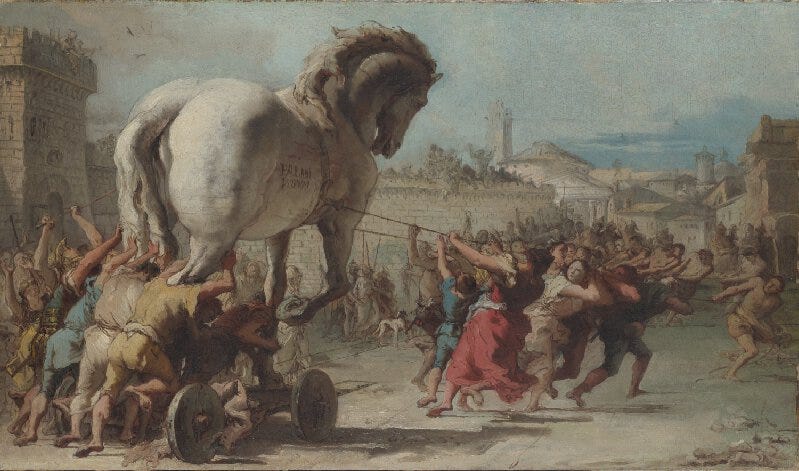Unapologetic Leadership
Apologies show strength, not weakness.

“The only thing necessary for the triumph of evil is for good men to do nothing.”— Edmund Burke
When you’re in charge, everything that goes wrong at your company isn’t your fault. That would be silly. You’re only one person; how could you be responsible for the actions and words of hundreds or thousands of employees?
Yet you’re expected to take charge. To step up and assume responsibility when something goes sideways. That’s what leaders do.
“The buck stops here,” as the sign on Harry Truman’s desk read. It was a universally understood message: regardless of ignorance, lack of involvement, or absence of intent, the leader must answer for it.
Earlier this week, I wrote about the importance of staying true to your word, following through on your intentions:
Words are worthless without behavior that underscores them. They become meaningless thought bubbles, wisps of intentions scattered by the winds that whip through a ghost town of ineffectual action.
Unfortunately, there are those who have no intention to behave in a way consistent with their words. Those who set out to deceive. Machiavelli understood this type of cunning individual:
“Everyone realizes how praiseworthy it is for a prince to honor his word and to be straightforward rather than crafty in his dealings; nonetheless contemporary experience shows that princes who have achieved great things have been those who have given their word lightly, who have known how to trick men with their cunning, and who, in the end, have overcome those abiding by honest principles…Men are so simple, and so much creatures of circumstance, that the deceiver will always find somebody ready to be deceived.” — Niccolò Machiavelli, 1513
Five hundred years on and we’ve maintained the ability to fool and be fooled, to give ourselves an escape clause or an excuse when things are out of our control or when we fail. The only thing that has changed over those five centuries is the number of ways we have of deceiving our fellow humans.
“The American genius for the artful dodge in its all-but-infinite variety—the sales pitch, the résumé, the cost overrun, the subprime loan, the building of the transcontinental railroad, the credit default swap, the derivative, the balloon mortgage, the missile gap, the housing bubble, the annual report, the Laffer curve, the Facebook page, the campaign promise, the 2003 invasion of Iraq—is firmly rooted in the country’s founding.” — Lewis H. Lapham, 2015
In some ways, this is a natural extension of the survival of the fittest. Exploit an advantage when you see an opening. Kill or be killed.
Which is perfectly understandable behavior when it's you versus a wild animal. But we like to think that the Homo sapiens species has evolved beyond our distant Neanderthal cousins. The Wild West afforded us the ability to express that primitive behavior as Americans expanded across the Continental Divide.
But what about the modern day? The inevitable Wild West came with the internet and social networks. There were no rules, no governance, no oversight. We’re seeing the harvest of those seeds now.
The sheriff, mayor, judge, executioner, and landowner were all vested in a single authority: Mark Zuckerberg on Facebook, Google on the rest of the web. They continued their crusade to conquer the vast plains of the web, to vanquish the unconnected, and to make their platforms the only solutions the public needed to consider.
They answered to no authority. They acted unapologetically. And in many ways, are still doing so.
Apologies Require Integrity
The leader who acts with integrity understands that mistakes happen, intentional or not, and — equally as important — acknowledges them. Apologizes for them.
What is an apology?
Simply put, it’s a two-part sentiment: one part that shows sorrow that something happened, the other part that shows concern. Put even more simply in mathematical terms:
Apology = Regret + Empathy
The most important emotion a leader can express is empathy. We’ve talked about it here previously:
Before a leader can express a degree of empathy, they need to express regret
If you can show that you care how someone else feels — employees, shareholders, vendors — they’re more apt to trust you and to give you the time necessary to correct what it is that's gone wrong. They might even volunteer to step in and assist with the process.
Simply acknowledging a wrong is an essential step in connecting with others. It shows that you care.
But before a leader can express a degree of empathy, they need to express regret, to be remorseful that something egregious happened to the entity entrusted to their stewardship.
Regret implies that they’ll avoid repeating the same mistakes. Stay attuned for individuals who don’t admit regret — or even worse, who offer regret but continue to make the same mistakes repeatedly. It means they aren’t following through on their word.
And that they’re probably planning another con at some point in the future.




